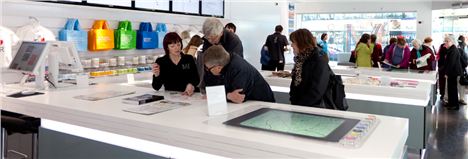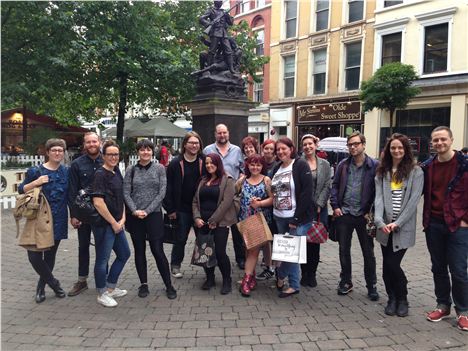THE AWARD-WINNING Manchester Visitor Information Centre (MVIC) is to close in April this year.
The recent round of council cuts have been shared amongst the various departments and this time Visitor Services have been hit. There will be redundancies of experienced staff.
Smart phones, the great hope of tourism authorities everywhere, do not replace the need for information boards, better ground-level information, leaflets, guidebooks and above all, people.
MVIC, aka the tourist information centre, is the focus for visitors who want face-to-face information about what to see and do in the city and across the region. It's also the location from which most guided walks begin.
A much reduced face-to-face service will open elsewhere in the city centre later in the year although the actual site has yet to be decided despite the very tight time frame. Central Library or the Town Hall Extension seem a good bet or perhaps, even, Piccadilly Gardens' TFGM office.
Nick Brooks-Sykes, Director of Tourism at Marketing Manchester, told Confidential: “As part of Manchester City Council’s efficiency savings, we are looking at how we can continue to deliver an award-winning tourist information service on behalf of the city council whilst reducing overheads.
"An opportunity to break our lease on our current premises will allow us to look at alternative, less costly premises. Manchester will continue to offer excellent visitor information services and that in the future these will be further enhanced by a growing presence online.”
MVIC closes by April
Brook-Sykes is putting a very positive spin on closure and relocation here.
In April 2013 the need for face-to face advice led the Manchester Business Improvement District (BID) to employ hosts in the main retail area of the city to supplement MVIC.
As for the online presence, this is what Confidential wrote last year (for the full article click here):
'Tourism is a visceral foot-to-the-ground experience, pacing the city, learning as you go. Smart phones, the great hope of tourism authorities everywhere who want to cut costs, help, but do not replace the need for information boards, better ground-level information, leaflets, guidebooks and above all, people. One day we may live in a digital tourism nirvana but not yet.'
The fragility of relying on a digital presence is underlined by the present homepage of the official Marketing Manchester VisitManchester website where a headline lists the Top 5 Freebies as John Rylands Library, RNCM, Heaton Park, Whitworth Art Gallery and Barton Aerodrome.
In January only one of these is actually correct - John Rylands Library. Heaton Park has its main winter feature, the Hall, moth-balled, Barton Aerodrome is miles from the centre and difficult to access, RNCM has a wonderful building but usually the public can only visit the canteen and the foyer, while Whitworth Art Gallery won't re-open for several months.
Advice is only any good if it makes sense and digital solutions can often end up more costly than traditional ones.
Of course the council are in a fix. They need to make cuts and these have to be shared. The shame of this is that in the year of Manchester International Festival, the launch of HOME, the re-opening of the Whitworth Art Gallery and in a time of growing visitor numbers to the city with high hotel occupancy, the axe has to chip away at services that bolster an economically vital element of any modern European city - tourism.
It must be stressed, as Brooks-Sykes points out, that not all direct face-to-face advice from a tourist information centre style operation is going, but this reduction in services probably reveals where we are headed.
Guests on a tour. Tourist numbers are increasing











